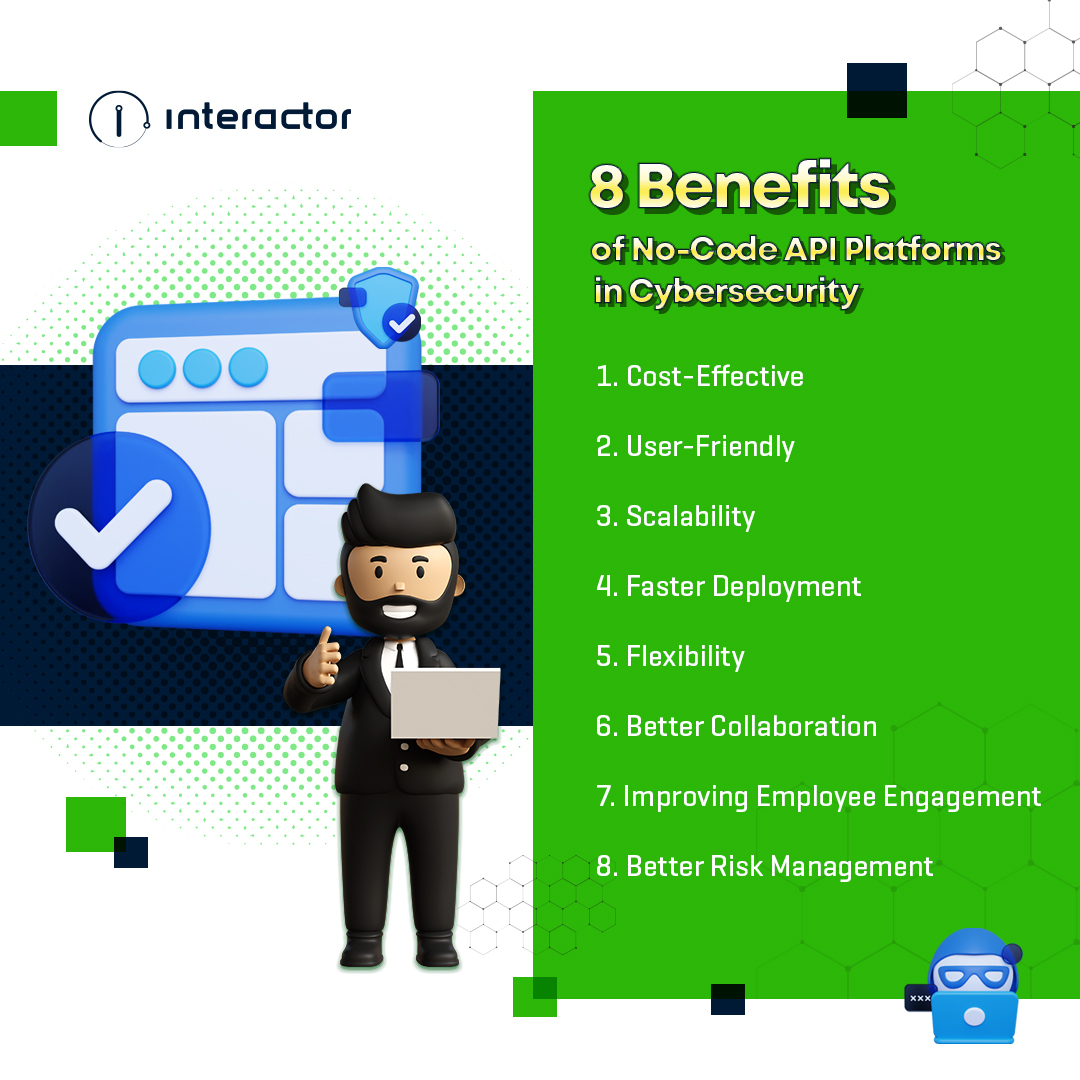No-Code APIs for Cybersecurity
In cybersecurity, API is starting to play a critical role in protecting and securing sensitive information and resources. If you are working in the security field, you likely have already seen an uptick in API usage. So, what’s with the no-code? No-code API platforms are used by businesses of all sizes to easily create and implement security protocols without needing a dedicated IT team or expensive software. Shifting the API development to the security teams accelerates data availability while increasing data security. Let’s face it, who knows security better?
Curious about how API can be used in cybersecurity? Interactor’s API AutoFlow is leveraged in many cybersecurity use cases, so we know first-hand how a no-code API platform can help you with your cybersecurity. Let’s dig into the challenges and best practices for implementing API security measures, including authentication, access control, and data exchange.
How Are No-Code API Platforms Used in Cybersecurity?
APIs can be used to provide data securely. Below are some of the most common API AutoFlow use cases in cybersecurity.
- Automating Security Tasks: No-code tools allow businesses to automate repetitive security tasks such as monitoring for security threats and updating software. This can free up time for IT teams to focus on more critical tasks.
- Improving Incident Response: With no-code tools, businesses can quickly create incident response plans and workflows, which can help them respond more effectively to security incidents.
- Authentication: APIs can authenticate users and devices before allowing them access to sensitive data or resources. This ensures that only authorized individuals and devices can access the information.
- Access Control: APIs can implement access control mechanisms, such as role-based access control (RBAC) and attribute-based access control (ABAC). These mechanisms ensure that only users with the appropriate permissions can access specific data or resources.
- Streamlining Threat Intelligence: No-code tools can help businesses quickly and easily identify and respond to security threats by aggregating and analyzing threat intelligence data.
- Creating Custom Security Solutions: Businesses can use no-code tools to create custom security solutions tailored to their needs without relying on pre-built software.
- Enhancing Compliance: No-code tools can help businesses ensure they are complying with industry regulations such as HIPAA and PCI-DSS by automating compliance checks and reporting.
- Data Masking: Sensitive data such as social security numbers can be masked through API.
- Data Exchange: APIs can securely exchange data between different systems and platforms. This allows organizations to share information with partners, customers, and other stakeholders in a secure and controlled manner.
- Integration: APIs enable different systems and applications to integrate, which is essential in a modern IT environment where multiple systems are in place. They allow different systems to access and share data, functionality, and other resources, which can improve efficiency, data quality, and security.
- Monitoring: APIs can monitor and log activity on a system, which is important for incident response, compliance, and forensic investigations.
- Automation: APIs can automate cybersecurity processes, such as vulnerability management, incident response, and threat intelligence gathering. This improves the efficiency and effectiveness of cybersecurity operations.
The Benefits
API platforms have become powerful enough to do most of the automation that requires custom scripting.
No-code API platforms in cybersecurity provide several benefits:
- Cost-Effective: No-code tools are often less expensive than traditional cybersecurity software, making them more accessible to businesses of all sizes.
- User-Friendly: No-code tools are designed to be user-friendly, so businesses don't need a deep understanding of cybersecurity to use them.
- Scalability: No-code tools can be easily scaled to meet the changing needs of a business without needing to invest in new software or hire additional staff.
- Faster Deployment: Businesses can use no-code tools to quickly create and implement security protocols, which can help them respond more quickly to security incidents.
- Flexibility: No-code tools allow businesses to create custom security solutions tailored to their specific needs.
- Better Collaboration: No-code tools allow different departments within a business to work together to address cybersecurity issues, improving overall security.
- Improving Employee Engagement: By allowing employees to build the company's security infrastructure and protocols, the sense of ownership and responsibility is increased while improving the overall security culture.
- Better Risk Management: No-code tools can help businesses better understand and manage their security risks by providing real-time data and analytics.

No-code API platforms are revolutionizing the way businesses approach cybersecurity.
With no-code tools, businesses of all sizes can easily create and implement security protocols without needing a dedicated IT team or expensive software. No-code tools can automate repetitive security tasks, create custom security solutions, and improve incident response. They can also help businesses ensure compliance with industry regulations and streamline threat intelligence.
Elevate Your Cybersecurity.
Interested in accelerating your organization’s cybersecurity with a No-Code API Platform? Learn More about API Autoflow and get in touch for a demo.

June 21, 2023

Comments